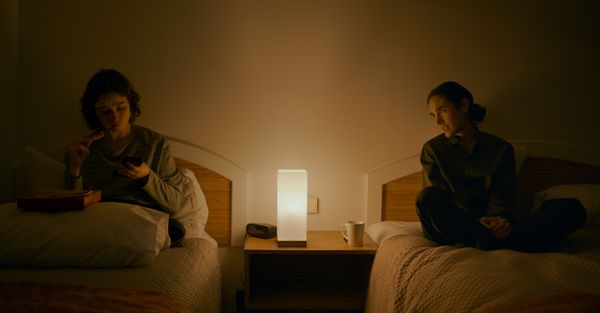 |
| Alice Englert as Dylan and Jennifer Connelly as Lucy in Bad Behaviour Photo: Matt Henley |
A sometimes mystical, sometimes ferocious mother/daughter comedy which includes one of the most satisfying scenes of violence you’re likely to see all year, questionable though that sentiment is in context, Alice Englert’s Bad Behaviour is a real treat. It’s the feature début, as writer and director, of Alice Englert, who also stars in it as young stunt performer Dylan, whose mother Lucy, played by Jennifer Connelly, is attending a retreat in an attempt to expand her mind, but struggles to deal with another attendee. There’s great support from a cast which includes Ben Whishaw and Beulah Koale.
If you’re already familiar with Alice, it’s probably because of her acting career. She utters a little gasp of excitement when I tell her that I loved her work in Goran Stolevski’s You Won’t Be Alone. Her star rose considerably due to the success of The Power Of The Dog, and she’s also been enjoying success on the small screen. With this in mind, I ask, what on earth possessed her to launch a second career, as a writer/director, just now?
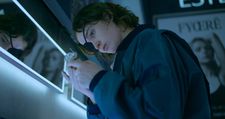 |
| Alice Englert in Bad Behaviour Photo: Matt Henley |
“I was writing it quite slowly since I was playing a naughty nurse in Ratched (in 2020), so I put my time,” she responds. “Because I made the two shorts first, and I had a really amazing experience doing that. I just felt full belly happy, you know, like, ‘My goodness, I feel happy and it doesn't even feel like it's fake!’” She laughs. “It made me know that I was definitely going to keep writing.
“I love working in teams and I love being able to collaborate and I also love to be in charge a little bit, too. With acting, you just never know when they're going to say yes or no. And I've been so lucky. I loved You Won't Be Alone and I love getting to do these gorgeous roles when they come along. It's a true love for me. But, yeah, there's always a lot of time for writing, I find.
I’ve just been low key trying to get everything together and actually make something that wouldn't get out of my head. And it's been pretty wonderful being able to do that, and with someone like Jennifer, and Ben and everybody else. It was so special. I love acting. I don't want to – I don't think I can stop. I love it, love it. But I can't not write either. I can't stop.”
It’s a big thing to take on, doing all those things at once in a film like this, because it's quite intensive for her as an actor as well. Holding one’s own opposite Jennifer Connelly is not an easy feat these days. How did she pull it off?
“I had amazing producers,” she says. “I can't overstress the importance of good, creative producers – and then also good pragmatic, practical, mathematical people on your side. It's just a gorgeous thing when all of you are in on it together and you're actually trying to make the same movie, you have the same intention.
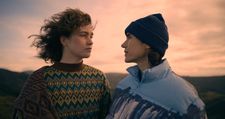 |
| Jennifer Connelly and Alice Englert Photo: Matt Henley |
“I like to try and write things that are weird enough that people aren't going to try and make money from them. They're going to want to come on because it creatively draws them, as opposed to it being exciting in the ways that a lot of other projects can be, which I also love as well. But I like to be true enough that the true ones are going to find me, too.
“I had just great producers, and a really incredible Dop. We were very on the same page. We spent a lot of prep time together and did a lot of drawings of what we were going to do, which, when we got to the day, we just were like, ‘Actually, just put the camera there.” She waves her hand casually, grinning. “You know, I think it's really important to prepare and prepare, and then forget what you thought was good and let your instinct work properly, because if you're too in your thinking plan, you're not going to be present. And that's the nature of the film.”
For the first half of the film, the tension is ratcheted up over and over again, even though it's a setting where we wouldn't expect that to be happening. I tell her that I think it’s one of the most tense films of the year, up until the point where it all explodes.
“That's so kind of you,” she exclaims, pressing her hand against her chest. “My heart! Well, I think, having been to quite a few of these retreats, it actually came quite naturally. A lot of people I know who go to them as well have a great sense of humor about it. And I do think it's important to have a little bit of a sense of humor about the things you love and that help you, just because otherwise, you know, being serious can only go so far. But it's pretty tense sometimes because everyone's trying to get out, get away, or accept or find some kind of resolution with the parts of themselves that they find the most grating. And it's a very...” She pauses, thinking for a moment. “It kind of reminds me of Sergio Leone films.
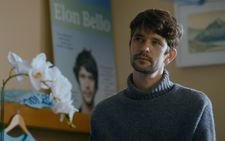 |
| Ben Whishaw in Bad Behaviour Photo: Marc Weakly |
“I was watching Once Upon A Time In The West a lot before I made the film because the way that he would use tension, it was always in the details of, like, the dripping and these strange clues of who everybody was. There's something also about a spiritual retreat because everyone's trying to get beyond the final frontier. Like, we've gone all over. We're trying to go up in the sky. We don't really know what's going on in the ocean – what's going on with the sharks, but also in ourselves, we still don't really know how to actually get beyond the ego. That reminds me of gold miners and panning for gold in frontier towns.
“You just never know when you're going to strike gold or when your whole life is going to change. There's a lot of that going on before you. If you find peace, who knows? Which is a wonderful thing. There's a big death rattle of the ego. It's like there's that extra strength that comes bounding back. So there's a lot of people dealing with some really funny stuff, but also really heavy stuff, and it's all side by side. I think it's fascinating. For me, it feels like being up in space. I imagine it like it's gravity, you know? It's epic. And it feels like our capacity to overthink things is epic. That's the kind of saga quality of it, to me.”
That process also creates space to explore aspects of a mother/daughter relationship that we wouldn’t normally see.
“Yeah. I'm so into mother/daughter dynamics. I can't get enough of them. I think it needs to be its own genre, like romcom or whatever, because it's really this creation myth to me. It's just so fascinating the way at some point in your childhood – and I'm thinking of Lucy as well – someone asks ‘Can you hold this for a second?’ And you do, and then suddenly they've never come back for it. And it's just all this emotional baggage from everything that already happened, and it's not yours, but you do have it now. Trying to figure out why you got it, or what to do with it, or who to give it to, is the old generational trauma. And trying to figure out how to actually just put it down and walk away is – yeah, it's simpler to say than to do.
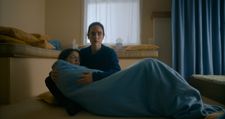 |
| Jennifer Connelly and Ana Scotney Photo: Matt Henley |
“I think it's just fascinating how hard we all are on our parents and also how much sometimes they do deserve it. I don't really think that the film is about forgiveness, because I don't think it has to be. For me, in many ways, it is, but it's a pick your own adventure. I wouldn't say it's a one size fits all at all. I just am fascinated that I'm becoming more and more adult, and there's that moment where you start to realise that you're going to, at some point, be the age that your parent was when they had you. And you're like, ‘Oh no, what would I tell a baby?’ Like, ‘What would I do? How the hell would I explain any of this human experience to a little person?’ I just think it's a wild and incredible feat to attempt to give any helpful advice to someone younger than you, whether they came out of you or not. Because, yeah, we're all just like old babies, really. And I love us. I love humans.”
She laughs again, remembering one of the exercises carried out at the retreat in the film.
“I always forget about the actual swaddling scene, even though I think the film says it better than I do. Which is why I like making movies. Because sometimes, oh, God, when I hear myself talk about what I really feel....” She trails off with a comically despairing look. “But when you make a film, you don't have to just use our boring vocabulary. You get to get into the beautiful unsaid of it all as well. Past all the limitations of vocabulary. You get to the point of it, finally.”





















